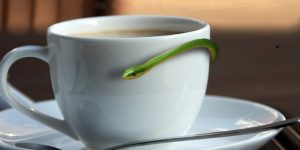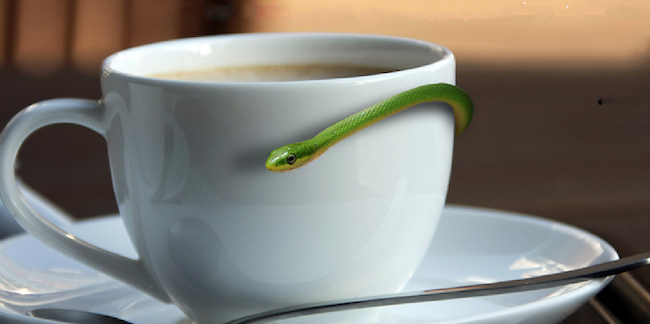
A discussion of Halachic topics related to the Parsha of the week. For final rulings, consult your Rav.
In medieval times, poisonous snakes and reptiles were commonly found even in populated areas. In keeping with the Torah’s strict exhortation to safeguard one’s life(1), the Rabbis issued an edict forbidding drinking certain beverages from an uncovered vessel which had been left unsupervised, for fear that a poisonous snake may have injected venom into its contents while drinking from it.(2)
1. This prohibition, known as mashkim megulim, “uncovered beverages,” is recorded in the Talmud(3) and codified by the Rambam as halachah which we are to practice today. But the Shulchan Aruch, who starts by quoting the Rambam, concludes by ruling that this edict no longer applies.(4) Since poisonous snakes and reptiles are rarely found in populated areas nowadays, there is no longer any reason to forbid drinking an uncovered, unsupervised beverage. The basic halachah follows this opinion and one is no longer required to concern himself with this prohibition.(5)
2. There are, however, poskim who maintain that the original edict applies even in our days. Their opinion is based on the following arguments: Although poisonous snakes and reptiles are no longer common in most places, they do exist in some remote areas. Since one can easily avoid drinking mashkim megulim, there is little justification to discount a Rabbinical edict which was enacted for our benefit and protection.(6) In addition, while it is true that we no longer fear being poisoned by a snake or other reptile, we are still concerned about the venom of other rodents which may be harmful, even if not fatal.(7)
A Rabbinic prohibition cannot be repealed even when the stated rationale no longer applies. This is because the Rabbis did not necessarily divulge all of the reasons behind their pronouncements. Consequently, even if the given reason is no longer applicable, we are still bound by the prohibition.(8)
3. As stated earlier, the basic halachah does not follow this opinion, and uncovered drinks may be consumed. Nevertheless, there are many people who choose to observe these halachos strictly,(9) and there are several sources who strongly recommend(10) avoiding mashkim megulim(11), especially in Eretz Yisrael.(12) The following rules, therefore, apply only to those who choose to keep the halachos associated with the Rabbinical prohibition of mashkim megulim:
QUESTION: Which beverages(13) are included in this prohibition and which are not?
DISCUSSION: The following beverages are included: Honey – bee’s honey only. Date honey is not affected by this prohibition. Milk – boiled or raw. Water, soda, beer, tea, coffee – boiled or unboiled, processed or unprocessed, flavored or unflavored.(14) Wine – uncooked only; yayin mevushal is permitted.(15) Uncooked grape juice is questionable.(16) Fruit juices, vinegar and oil are excluded from this prohibition.(17)
QUESTION: Are mashkim megulim prohibited only if left uncovered overnight?
DISCUSSION: No. A drink left uncovered and unsupervised even for a few moments, even during the daytime, is classified as mashkim megulim.(18)
A. “Uncovered” means completely uncovered. If the beverage was loosely covered with a paper plate or napkin etc., that is sufficient.(19) If the beverage was left uncovered inside a closed refrigerator, it is permitted.(20) If the beverage was left on the stove in an uncovered pot which was boiling and emitting steam, it is permitted.(21)
B. “Unsupervised” means that the beverage was left completely alone(22) for a few moments. If, however, there was a person who was fully awake – even a baby(23) – in the room(24), the prohibition of mashkim megulim does not apply.(25) This holds true even if the person in the room was not watching the beverage at all, and even if his eyes were closed the entire time and even if the room was dark.(26)
C. Some poskim hold that yotzei venichnas supervision – i.e., a beverage left uncovered and unsupervised in a room where someone is constantly coming and going, is considered sufficient supervision.(27) Others, however, hold that yotzei venichnas is not valid for mashkim megulim.(28)
D. Note: Even those who are generally lenient with mashkim megulim are careful not to use such wine for Kiddush(29) or for other ritual purposes which require wine, such as havdalah and Birkas ha-mazon(30), since it is considered demeaning to use mashkim megulim for mitzvos. L’chatchilah, therefore, wine which was left uncovered and unsupervised even for a brief period – as little as 20 minutes(31) – should not be used for mitzvos. If, however, no other wine is available one may use such wine as long as the wine’s taste and smell were not compromised in any way.(32) If the wine was left uncovered for five or six hours,(33) and surely if it was left uncovered over night, we are concerned that its taste or smell was affected and it may not be used for Kiddush etc. even b’dieved.(34)
FOOTNOTES:
1 Va’eschanan 4:9; 4:15, as explained by the Talmud, Berachos 32b. See Beiur ha-Gra C.M. 427:8.
2 Although this is a Rabbinical prohibition, some poskim maintain that once the Rabbis pointed out that mashkim megulim may be dangerous, drinking from them becomes forbidden min ha-Torah; see Levush C.M. 427:11, Tevuos Shor 13:2 and Chasam Sofer, Avodah Zarah 30a.
3 Avodah Zarah 30a and Chulin 9b. The original source is a Mishnah in Terumos 8:4.
4 Y.D. 116:1, based on the view of Tosfos, Rashba and Tur.
5 Mishnah Berurah 160:23.
6 Pri Chadash and Pri Toar, quoted by Birkei Yosef and Aruch ha-Shulchan Y.D. 116:1.
7 Talmidei Rabbeinu Yonah, Avodah Zarah. See also Levush Y.D. 116:1.
8 The Vilna Gaon (quoted in Ma’asei Rav 95 and in Pe’as ha-Shulchan 2:32).
9 Mashkim megulim, unlike non-kosher food, are not bateil b’shishim (Chochmas Adam 68:1; Aruch ha-Shulchan 116:10).
10 See Pischei Teshuvah Y.D. 116:1 quoting Shelah ha-Kadosh, that while uncovered drinks are halachically permitted, it is advisable to refrain from drinking them.
11 In addition to the sources quoted above, see Kitzur Shulchan Aruch 33:5 who warns against drinking mashkim megulim. See also Orchos Rabbeinu, vol. 1, pgs. 206-209 quoting the Chazon Ish and the Steipler’s strict adherence to all of the laws of mashkim megulim, even to the extent of not using such water for washing the hands.
12 Birkei Yosef Y.D. 116:3 and Pe’as ha-Shulchan 2:32. See Minchas Yitzchak 9:85.
13 The Talmudic prohibition also included juicy fruits, e.g. watermelons and grapes, which were cut or split open and left unsupervised; see Beitzah 7b and Rambam, Rotzeiach 11:8. However, nowadays, even those who are stringent with mashkim megulim do not mention unsupervised fruits as being prohibited, unless there is clear evidence that the fruit was tampered with. When in question, consult a rav.
14 Orchos Rabbeinu, vol. 1, pg. 206; Shemiras Nefesh 11:28, quoting Chazon Ish.
15 Rambam, Rotzeiach 11:8. There is, however, a debate among contemporary poskim whether or not yayin mevushal on the market today is cooked in such a way as to qualify as “mevushal.” See The Weekly Halachah Discussion, vol. 1, pgs. 197-199 for an elaboration on this issue.
16 Harav C. Kanievsky (Shemiras Nefesh, Responsa #59).
17 Rambam, Rotzeiach 11:7.
18 Rambam, Rotzeiach 11:11; Aruch ha-Shulchan Y.D. 116:3. Chazon Ish is quoted as remarking that we do not know the exact time period which renders mashkim as megulim. [In addition to the edict against mashkim megulim, there is an additional advisory against drinking beverages that were left uncovered and unsupervised overnight; see Masseches Deretz Eretz 11 and Tzavas R’ Eliezer ha-Gadol 62, quoted by Harav C. Kanievsky in Shemiras Nefesh.]
19 Orchos Rabbeinu vol. 1, pg. 208, quoting Chazon Ish
20 Kaf ha-Chayim 272:9; Harav C. Kanievsky quoting Chazon Ish (Shemiras Nefesh 11:84); Shevet ha-Kehasi 1:112.
21 Rambam, Rotzeiach 11:8.
22 A closed circuit camera is not considered supervision concerning mashkim megulim; Harav C. Kanievsky (Shemiras Nefesh, Responsa #11).
23 Based on Midrash Rabbah, Noach 34:12
24 Or even in a nearby room from where he can see into the room where the beverage is; Harav C. Kanievsky (Shemiras Nefesh, Responsa #17).
25 Perishah Y.D. 116:12. Some poskim rely on this type of supervision for all drinks except for wine; Pri Chadash Y.D. 116, based on the view of the Rif and Rosh.
26 Harav C. Kanievsky (Shemiras Nefesh, Responsa #77).
27 Nefesh Adam #6, based on Yerushalmi, Terumos 8:4, quoted by the Meiri, Avodah Zarah 30a.
28 Pri Chadash Y.D. 116:1 This is also the view of Chazon Ish and the Steipler as quoted in Orchos Rabbeinu.
29 O.C. 272:1.
30 Birkei Yosef O.C. 272:1; Beiur Halachah 272:1 (s.v. al); Aruch ha-Shulchan 272:5.
31 Divrei Malkiel 4:1
32 Mishnah Berurah 272:3; Kaf ha-Chayim 272:7. See Az Nidberu 1:7.
33 Divrei Malkiel 4:1
34 Aruch ha-Shulchan 272:5. See Az Nidberu 1:7
Weekly-Halacha, Copyright © 2003 by Rabbi Neustadt, Dr. Jeffrey Gross and Torah.org. Weekly sponsorships are available–please send email to the moderator, Dr. Jeffrey Gross [email protected].
Rabbi Neustadt is Rav of Young Israel in Cleveland Heights. He may be reached at 216-321-4635 or at [email protected].


